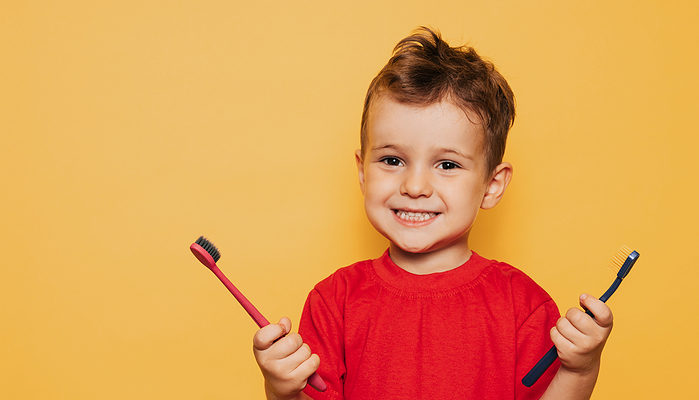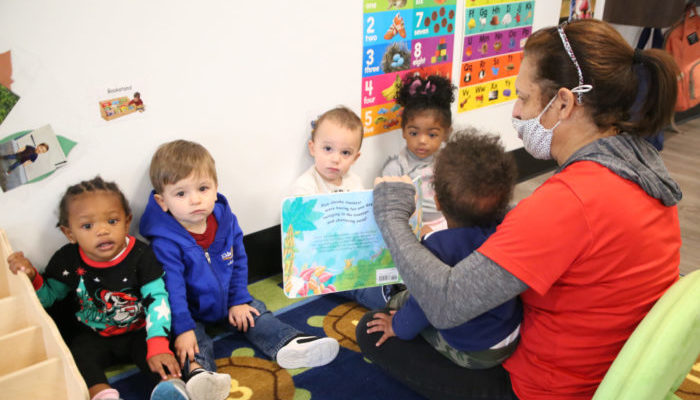February is National Children’s Health Dental Month, and Kids R’ Kids at Avalon Park want all children to have happy, healthy smiles. However, because we’re so busy, it’s easy to overlook the importance of good dental habits for our kids and their development. This blog post examines why good dental care is essential, what causes poor dental health in children, and how to change your child’s dental health habits.
 Why Dental Health is So Important For Children
Why Dental Health is So Important For Children
According to the Centers for Disease Control and Prevention (CDC), “Cavities are the most common chronic disease of childhood in the United States. Children who have poor oral health often miss more school and receive lower grades than children who don’t.” Moreover, children with poor dental health can develop speech and self-esteem problems as they age.
Causes of Poor Dental Health in Children
Tooth decay affects more young children than you may realize. Studies show that nearly half of the children in the United States have at least one decayed tooth. The National Institute of Dental and Craniofacial Research says that “42% of children aged 2 to 11 will develop at least one cavity.”
Why do so many children develop cavities? One word: Sugar. It’s no surprise that kids love their sweets, and it’s easy to allow them to overindulge in foods and drinks that contribute to tooth decay. Because children tend to snack during the day on sugary and starchy foods, it’s easy to see how quickly they can run into dental problems.
The most common culprits of childhood tooth decay are:
- Raisins
- Candy
- Cake
- Cereal
- Bread
- Milk
- Fruit Juice
- Soda
Frequent snacking on these foods and drinks combined with poor dental hygiene is a recipe for disaster for our children’s dental health.
 Early Warning Signs of Poor Dental Health in Children
Early Warning Signs of Poor Dental Health in Children
Although the statistics paint a bleak picture, the truth is that, like many diseases, there are warning signs of poor dental health parents can watch for to take action and prevent the deterioration from worsening. Here are the most common signs that your child may have a cavity or other dental issue.
Sensitivity to Hot or Cold Beverages
One of the earliest warning signs of tooth decay is sensitivity to hot and cold beverages. Overeating sugar causes tiny holes in the tooth’s enamel, exposing nerve endings. If your child drinks something hot or cold and feels pain in a tooth, it’s almost always the onset of a cavity that’s the culprit.
Toothaches
Sometimes, a child might complain about a general toothache, which could be the beginning of a cavity.
Tooth Discoloration
Even if your child isn’t complaining about tooth pain, it’s a good idea to regularly check their teeth for black or brown spots, which typically mean decay.
Bad Breath
No one expects their child to have minty breath all the time, but if you notice that your kid’s breath is chronically bad, it means there are too much bacteria in their mouths. Bacteria is a primary cause of tooth decay, so instead of giving your kid a piece of gum or breath mint, take them to the dentist for an evaluation.
Bleeding Gums
Gingivitis and tooth decay often go together. Gingivitis, known as gum disease, can lead to tooth loss and results from poor oral hygiene, just like cavities. Gingivitis causes the gums to swell, which can lead to bleeding, especially when your kids brush their teeth or floss.
How to Instill Good Dental Habits in Your Kids
The good news about tooth decay is that it’s almost entirely preventable, so it’s crucial that you get your children to take care of their teeth as early as possible.
Start Early
The earlier you can instill good dental habits in your children, the better. Make brushing and flossing part of your kid’s daily routine when their baby teeth come in. If your child is still a baby, the CDC recommends wiping your baby’s gums twice a day with a soft, clean cloth in the morning after their first feeding and before bed to remove bacteria and sugars. Starting early creates good dental habits that stick through preschool and beyond!
Be a Good Role Model
Young children imitate their parents. So, if you demonstrate that good oral hygiene is important to you, it will be to them. A fun way to do this is to make brushing and flossing a family affair every day.
Limit Their Sugary Snacks
As mentioned, sugary foods and drinks are the primary cause of early tooth decay in kids. It’s nearly impossible to police all the food your children take in during the day, especially when they’re at school or a friend’s house, but you can control what they get at home. And, while you can’t eliminate your kid’s love of snacking, you can give them better options than candy, soda, or fruit juice.
If your child still uses a bottle, experts say to be choosy about what you give them and to avoid sugary drinks and juices as much as possible.
Schedule Regular Checkups
Lastly, taking your child to the dentist for regular checkups can help detect early signs of tooth decay or other dental issues and rectify them before they worsen and cause further medical problems. The Center for Pediatric Dentistry recommends starting regular dental checkups when your child reaches age one or as soon as their first tooth appears and getting a checkup at least twice a year.
By teaching your kids the importance of good oral hygiene, taking them for regular checkups, and limiting their sugary food intake, you can help them maintain a healthy smile for a lifetime.
 Schedule a Tour
Schedule a Tour
Kids R’ Kids at Avalon Park offers a VPK program that sets your child up for success in kindergarten and beyond. Our facility provides an exciting learning environment with creative, fun, and technology-driven educational programs to aid your child’s development. Call us today at 407-306-9035 or fill out our online form to schedule a tour.